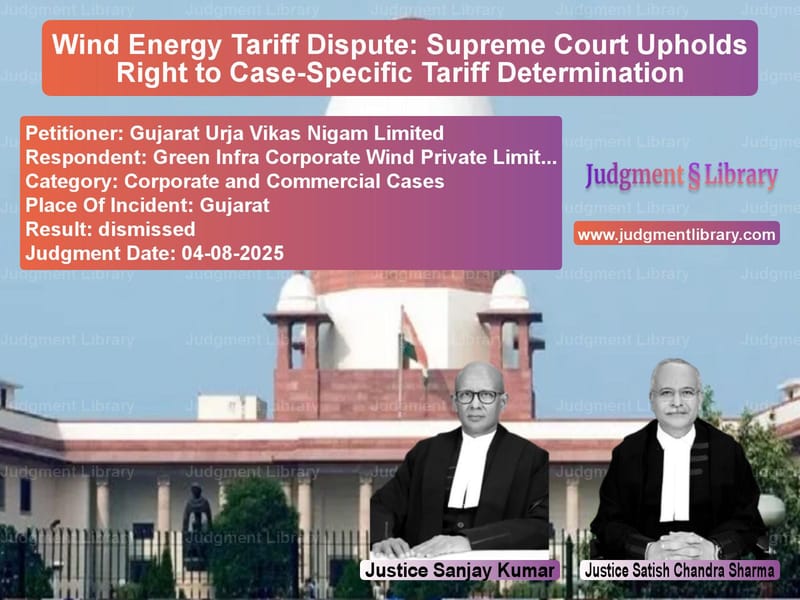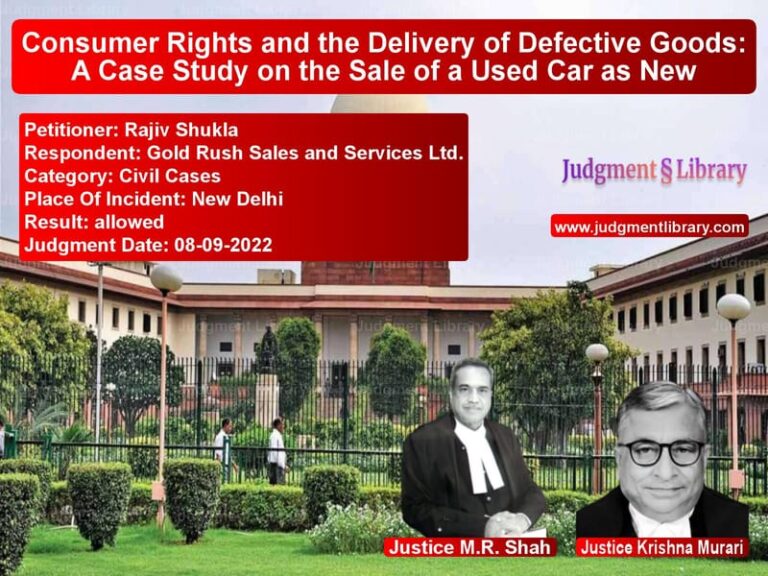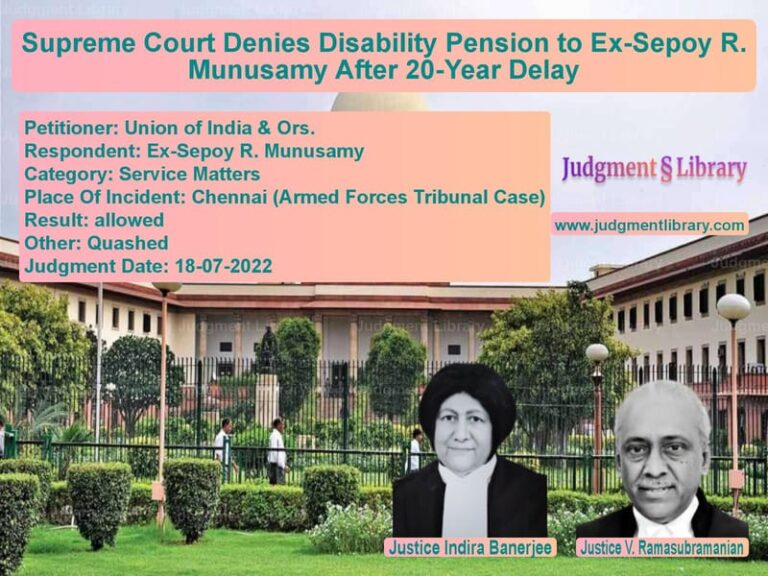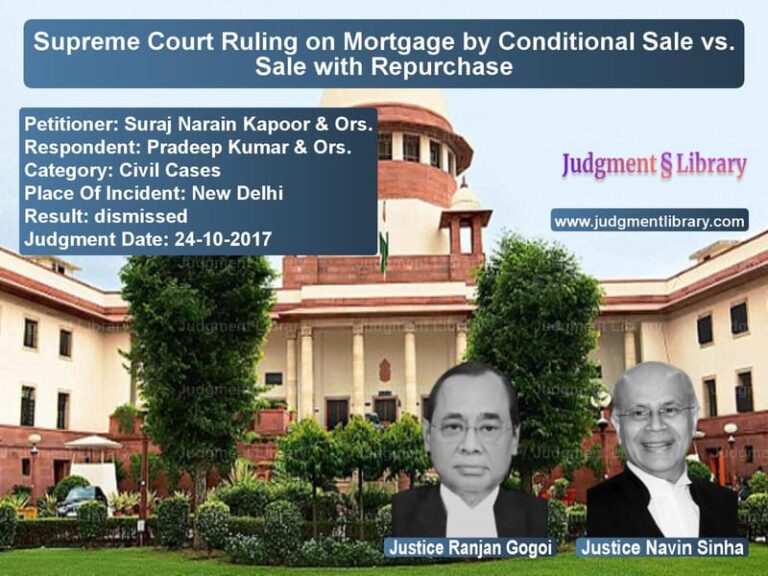Wind Energy Tariff Dispute: Supreme Court Upholds Right to Case-Specific Tariff Determination
In a significant ruling that balances contractual obligations with statutory rights in the renewable energy sector, the Supreme Court of India delivered a judgment on August 4, 2025, concerning tariff disputes between Gujarat Urja Vikas Nigam Limited (GUVNL) and four wind energy companies. The case revolved around whether wind energy producers who had signed Power Purchase Agreements (PPAs) with a fixed tariff could later approach the regulatory commission for case-specific tariff determination when they did not avail accelerated depreciation benefits.
The legal battle began when Green Infra Corporate Wind Private Limited, Vaayu (India) Power Corporation Private Limited, Green Infra Wind Power Limited, and Tadas Wind Energy Private Limited approached the Gujarat Electricity Regulatory Commission (GERC) seeking individual tariff determination, claiming they hadn’t availed accelerated depreciation benefits under income tax laws. Both GERC and the Appellate Tribunal for Electricity (APTEL) ruled in favor of the wind energy companies, leading GUVNL to approach the Supreme Court.
The Core Legal Issue
The fundamental question before the court was straightforward yet legally complex: Could wind energy companies that had voluntarily signed PPAs with a fixed tariff rate later seek case-specific tariff determination from the regulatory commission simply because they chose not to claim accelerated depreciation benefits?
GUVNL, the state electricity distribution company, argued vehemently that having signed binding contracts, the wind energy producers couldn’t subsequently change their minds and seek more favorable tariff terms. The appellant contended that the PPAs explicitly specified a tariff of ₹3.56 per kWh, and this contractual commitment should be binding for the entire 25-year duration of the projects.
GUVNL’s Arguments
The electricity distribution company presented compelling arguments rooted in contract law principles. “GUVNL contested their claim before the GERC, arguing that these wind energy projects had willingly entered into PPAs with it, binding themselves to the tariff rate of ₹3.56 per kWh, and were, therefore, not at liberty to seek determination of tariff on a case-to-case basis thereafter.” The company further asserted that “in the light of the valid, binding and enforceable contracts between the parties, embodied in the PPAs, the wind energy projects could not seek such benefit.”
GUVNL took a firm commercial stance, stating that “had these projects opted for a case-to-case specific tariff, it would not have even entered into PPAs with them.” The company emphasized that it “had not entered into any PPAs with wind energy projects that had not availed the benefit of accelerated depreciation” and couldn’t be compelled to accept a change of position by the power producers.
The Regulatory Background
The case had its origins in GERC’s Order No. 1 of 2010 dated January 30, 2010, which determined tariffs for wind energy projects. This order explicitly stated that the tariff of ₹3.56 per kWh was applicable specifically to projects that availed accelerated depreciation benefits. The regulatory commission had clearly ruled that “for a project which does not get such benefit of accelerated depreciation under the Act of 1961, the Commission would, on a petition in that respect, determine a separate tariff taking into account all the relevant facts.”
This distinction was crucial because accelerated depreciation significantly reduces tax liability, thereby affecting the overall financial viability and required tariff for power projects. The GERC had acknowledged this fundamental difference in its original tariff order, creating a pathway for case-specific determinations.
The Statutory Framework
The court examined the intricate interplay between the Electricity Act, 2003, and the Income Tax Act, 1961. Under income tax provisions, wind energy projects generating power after April 1, 1997, had the option to choose between accelerated depreciation (80%) or normal depreciation, with this choice to be exercised when filing income tax returns for the assessment year relevant to the year when power generation commenced.
The court noted the fundamental timing problem faced by power producers: “Unless it generates power and sells it to a distribution licensee under a PPA, the power producer would not file its return of income in relation thereto. It is only at that stage that it is required to exercise its option to choose the rate of depreciation, but it would have already signed a PPA as it cannot sell the power generated by it without first entering into a PPA.”
Critical Judicial Observations
The Supreme Court made several significant observations that shaped its final decision. The bench emphasized that “GUVNL is an instrumentality of the State and was, therefore, bound by the policy directives of the State. It cannot advance commercial considerations in isolation on par with a private party, divorced from its responsibility to abide by and further the policy objectives of the State.”
The court highlighted the statutory nature of tariff determination, noting that “the price at which power is to be procured by a distribution licensee from a generating company is not a matter of consensus and private agreement between the parties as it is to be fixed statutorily by the Appropriate Commission.”
In a particularly strong observation, the court stated: “This liberty and discretion given to an assessee could not be truncated or cut-short by GUVNL by fixing a binding price unilaterally in the PPA executed long before the assessee had to statutorily choose its option.”
The Commitment Factor
A crucial aspect that weighed heavily in the court’s decision was the absence of explicit commitments from the wind energy companies regarding their depreciation choices. The court pointed out that “GUVNL never secured any written commitments from the four respondent companies that they would only avail accelerated depreciation and would not choose to opt for the regular depreciation rate when the time came.”
The bench observed that “without securing such commitments from them, merely because these companies signed the PPAs with a fixed tariff which was applicable only to those projects that availed accelerated depreciation, GUVNL cannot take advantage of its dominant position and its PPAs so as to bind them to the price mentioned therein for the entire life of their projects.”
Policy Objectives and State Responsibility
The judgment extensively referenced India’s renewable energy policies and the government’s commitment to promoting clean energy. The court noted that “GUVNL is bound to promote and give effect to the Government’s policy of encouraging generation of power from renewable energy sources.”
Referring to Gujarat’s Wind Power Policy of 2007 and 2013, the bench emphasized the state’s commitment to renewable energy development due to “the dwindling resources of fossil fuels; increased threat of global warming; and the concerns of environmental protection.” The court stressed that as a state instrumentality, GUVNL couldn’t act contrary to these policy objectives.
Distinguishing from Precedent
The court carefully distinguished the present case from its earlier decision in Gujarat Urja Vikas Nigam Limited vs. EMCO Limited, noting that the factual matrix was fundamentally different. In EMCO Limited, the power producer had sought tariff fixation under a subsequent tariff order rather than seeking case-specific determination under the applicable tariff order.
The bench relied more strongly on the principles established in Gujarat Urja Vikas Nigam Limited vs. Tarini Infrastructure Limited, where the court had held that “tariff determination was made in exercise of statutory powers and the same only got incorporated in a mutual agreement between the two parties involved.”
The Court’s Final Ruling
In its concluding remarks, the Supreme Court delivered a clear and unambiguous verdict: “Given the circumstances obtaining in the appeals on hand and in the light of the law laid down by this Court earlier in Tarini Infrastructure Limited (supra), it is not open to GUVNL to contend that the four respondent companies are estopped from seeking determination of tariff by the GERC as they had willingly signed PPAs with it at the tariff fixed for wind energy projects availing accelerated depreciation.”
The court firmly stated that “GUVNL cannot apply that wholly inapplicable tariff to the respondent companies which, admittedly, did not avail accelerated depreciation.” In a final strong rebuke, the court observed that “patently unfair treatment was sought to be meted out by GUVNL to the respondent companies by binding them to a rate that was wholly inapplicable to them. Such conduct, akin to a Shylock, does not reflect positively upon GUVNL.”
Broader Implications
This judgment reinforces the principle that statutory rights cannot be curtailed by contractual arrangements, especially when state instrumentalities are involved. The decision underscores the supremacy of regulatory determinations over contractual terms in the electricity sector and emphasizes the responsibility of state-owned entities to further policy objectives rather than purely commercial interests.
The ruling provides clarity on the rights of renewable energy producers to seek appropriate tariff determination based on their actual financial circumstances and tax choices. It also establishes important precedents regarding the timing of statutory choices and the limitations of using dominant bargaining power to override statutory rights.
For the renewable energy sector specifically, this judgment ensures that power producers who genuinely forego tax benefits receive fair compensation through appropriate tariff mechanisms, thereby supporting the financial viability of renewable energy investments and advancing India’s clean energy transition goals.
Petitioner Name: Gujarat Urja Vikas Nigam Limited.Respondent Name: Green Infra Corporate Wind Private Limited and Others.Judgment By: Justice Sanjay Kumar, Justice Satish Chandra Sharma.Place Of Incident: Gujarat.Judgment Date: 04-08-2025.Result: dismissed.
Don’t miss out on the full details! Download the complete judgment in PDF format below and gain valuable insights instantly!
Download Judgment: gujarat-urja-vikas-n-vs-green-infra-corporat-supreme-court-of-india-judgment-dated-04-08-2025.pdf
Directly Download Judgment: Directly download this Judgment
See all petitions in Contract Disputes
See all petitions in Corporate Governance
See all petitions in Corporate Compliance
See all petitions in Judgment by Sanjay Kumar
See all petitions in Judgment by Satish Chandra Sharma
See all petitions in dismissed
See all petitions in supreme court of India judgments August 2025
See all petitions in 2025 judgments
See all posts in Corporate and Commercial Cases Category
See all allowed petitions in Corporate and Commercial Cases Category
See all Dismissed petitions in Corporate and Commercial Cases Category
See all partially allowed petitions in Corporate and Commercial Cases Category







